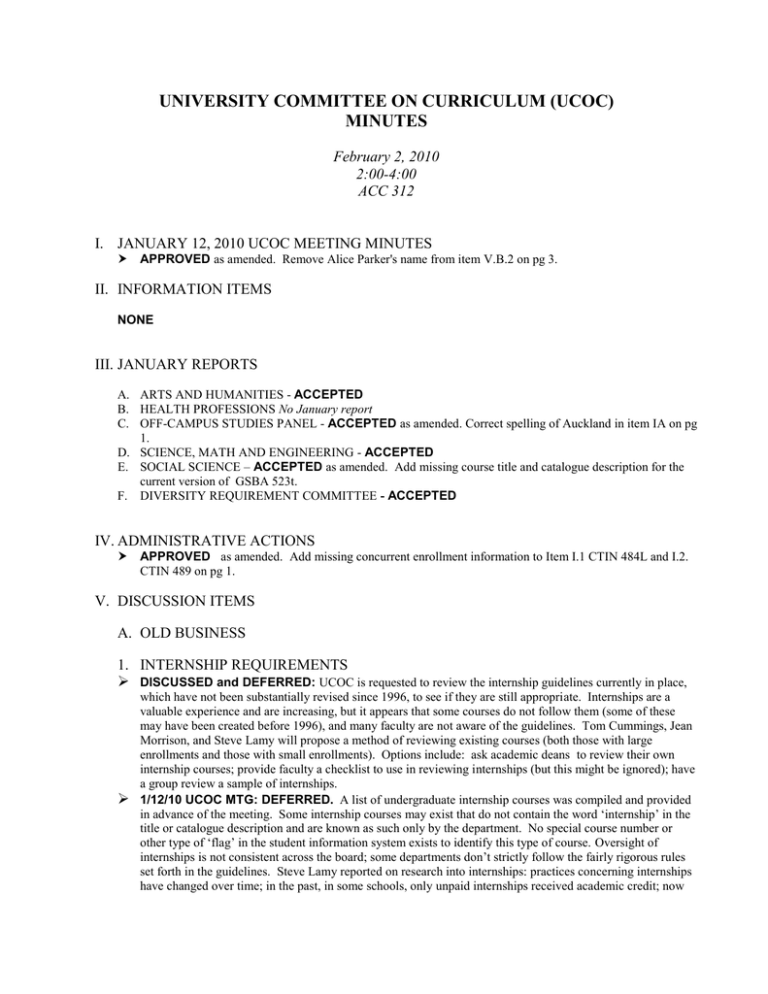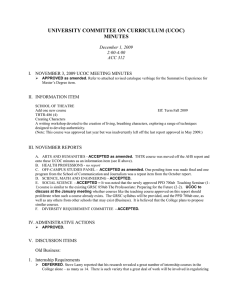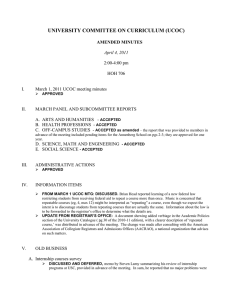UNIVERSITY COMMITTEE ON CURRICULUM (UCOC) MINUTES
advertisement

UNIVERSITY COMMITTEE ON CURRICULUM (UCOC) MINUTES February 2, 2010 2:00-4:00 ACC 312 I. JANUARY 12, 2010 UCOC MEETING MINUTES APPROVED as amended. Remove Alice Parker's name from item V.B.2 on pg 3. II. INFORMATION ITEMS NONE III. JANUARY REPORTS A. ARTS AND HUMANITIES - ACCEPTED B. HEALTH PROFESSIONS No January report C. OFF-CAMPUS STUDIES PANEL - ACCEPTED as amended. Correct spelling of Auckland in item IA on pg 1. D. SCIENCE, MATH AND ENGINEERING - ACCEPTED E. SOCIAL SCIENCE – ACCEPTED as amended. Add missing course title and catalogue description for the current version of GSBA 523t. F. DIVERSITY REQUIREMENT COMMITTEE - ACCEPTED IV. ADMINISTRATIVE ACTIONS APPROVED as amended. Add missing concurrent enrollment information to Item I.1 CTIN 484L and I.2. CTIN 489 on pg 1. V. DISCUSSION ITEMS A. OLD BUSINESS 1. INTERNSHIP REQUIREMENTS DISCUSSED and DEFERRED: UCOC is requested to review the internship guidelines currently in place, which have not been substantially revised since 1996, to see if they are still appropriate. Internships are a valuable experience and are increasing, but it appears that some courses do not follow them (some of these may have been created before 1996), and many faculty are not aware of the guidelines. Tom Cummings, Jean Morrison, and Steve Lamy will propose a method of reviewing existing courses (both those with large enrollments and those with small enrollments). Options include: ask academic deans to review their own internship courses; provide faculty a checklist to use in reviewing internships (but this might be ignored); have a group review a sample of internships. 1/12/10 UCOC MTG: DEFERRED. A list of undergraduate internship courses was compiled and provided in advance of the meeting. Some internship courses may exist that do not contain the word ‘internship’ in the title or catalogue description and are known as such only by the department. No special course number or other type of ‘flag’ in the student information system exists to identify this type of course. Oversight of internships is not consistent across the board; some departments don’t strictly follow the fairly rigorous rules set forth in the guidelines. Steve Lamy reported on research into internships: practices concerning internships have changed over time; in the past, in some schools, only unpaid internships received academic credit; now UCOC Minutes 02/2/2010 Page 2 of 4 some units and the organizations that sponsor internships consider paid internships to be more ‘serious’ by the students and the organizations. Labor laws may require unpaid students to get academic credit. The committee discussed what, if anything, should be done about the existing internship courses if they aren’t as rigorous as the guidelines and whether internship courses should be reviewed periodically as we do with diversity. As the university emphasizes the importance of the internship experience it is essential that steps are taken to ensure the experience is of high quality and well guided. Tom Cummings, Jean Morrison and Steve Lamy agreed to develop a proposal for UCOC review in February. 12/1/09 UCOC MTG: DEFERRED. Steve Lamy reported that his research revealed a great number of internship courses in the College alone – as many as 14. There is such variety that a great deal of work will be involved in regularizing them across the board. Most are at the undergraduate level. As many as 80% at the undergraduate level do not follow the established guidelines For example, some internships are attached to institutes, are not run by tenure track faculty, but non-tenure track faculty and staff instead, so there is insufficient faculty oversight and insufficient central reporting. Some don’t allow paid internships, others do. The existing guidelines will be provided for the discussion in January, as well as enrollment reports for the courses in question. 11/3/09 UCOC MTG: DISCUSSED AND DEFERRED. Current internship guidelines from the 2009-10 SCampus, and the 2009-10 Curriculum Handbook were provided to the committee in advance of the meeting. There is concern that some schools on campus are offering internships in courses that have not been formally approved for designation as an internship course, such as 490. The department doing this was asked to submit a course request so it could offer students this opportunity with an aptly named, and approved internship course. Concerns were also expressed about students who earn money for internship work, in some schools that is accepted and in others it is not. Internships offered in overseas studies programs are also of concern. Steve Lamy agreed to look into this and report back to UCOC in December. 2. PROLIFERATION OF TEACHING SEMINARS DISCUSSION: Lawford Anderson attended the meeting on behalf of the CET. CET runs workshops and forums during the semester for all students. They plan to drop GRSC 850ab, which was excellent but had few students and took much faculty time. This professionalization opportunity has been replaced by the Teaching Assistant Fellows program. There are also faculty fellows and undergraduate fellows. A hard copy of the CET spring schedule is available. Juliet Musso spoke for the Social Science Subcommittee re: the three SSS courses mentioned. There is a distinction between TA training and professionalization activities. No academic credit should be given to graduate students for learning to be a teaching assistant. Some proposed courses cover both TA training and professionalization, which is not appropriate. TA training is offered by CET in half-day workshops, and some departments offer their own TA training workshops. This non-credit training should not be part of professionalization courses, which should teach how to design a course and develop syllabi, and pedagogical principles. Although the syllabus for PPD 700ab may look generic, in fact the examples used are disciplinespecific. Such professionalization courses can appropriately earn a small number of units. 1/12/10 UCOC MTG: DEFERRED; CET representatives (Lawford Anderson, Dana Coyle and Gene Bickers) are to be invited to February 2 UCOC meeting. Syllabi for GRSC 850ab, PPD 700ab and BUCO 637 were provided to UCOC members in advance of the meeting. GRSC 850ab was developed in 2005, and great effort was expended for a relatively small number of students (20). Those offering the course thought it might be more effective if it were to be taught at the disciplinary/department level. It was not taught this year – last time taught was 2007-08. Marshall required theirs for a while, then discontinued. GRSC 850ab was taught on weekends, faculty put in lots of work, students appreciated the cross-disciplinary nature; but it was too much work for too few students. Juliet Musso said the PPD course is taken very seriously. When she reviewed proposal for the new BUCO course she noticed that it and the others too do not reflect discipline-specific readings. The value of such a course is not in question, but the difference between it and TA training must be maintained. When the CET was in charge of TA training they established Fortnightly Gatherings on Teaching (FGOT) and TAs who attended fewer than 7 in a semester did not continue as TAs. These Gatherings could be revised and revived. Syllabi exist for lectures and workshops thru CET, and lunchtime and evening sessions are available. 12/01/09 UCOC MTG: It was noted that the newly approved PPD 700ab Teaching Seminar (1-1) course is UCOC Minutes 02/2/2010 Page 3 of 4 similar to the existing GRSC 850ab The Professoriate: Preparing for the Future (2-2). UCOC to discuss at the January meeting whether courses like the teaching course approved on this [the SSS] report should proliferate when such a course already exists. The GRSC syllabus will be provided, and the PPD 700ab one, as well as any others from other schools that may exist (Business). It is believed that the College plans to propose similar courses. B. NEW BUSINESS NOT ON THE AGENDA, BUT DISCUSSED: 1. DISCUSSED AND DEFERRED: Jean Morrison and Tom Cummings met with the Engineering School lDean Yannis C. Yortsos and associate Dean Margie Berti. They requested that they be provided with an Engineering syllabus to use as a template. It was suggested that such a syllabus ought to be solicited from an Engineering faculty member teaching an existing course – perhaps an ABET-friendly syllabus.. Steve Bucher agreed to send an email to Assistant Dean John O’Brien to solicit one, possibly in ISE. 2. DISCUSSED AND DEFERRED: Steve Lamy said that the College is trying to increase the (currently small) number of syllabi posted on the Schedule of Classes, but some faculty are proprietary about their syllabi and resist making them public. Students would like to be able to see syllabi in advance. One of the student representatives said this could replace the sometimes-suggested “shopping period” for courses at the beginning of the semester. UCOC could make a recommendation that every course have a “web presence” which could be accommodated through the Schedule of Classes, Blackboard, and/or a link on the SOC to the course website. Alice Parker agreed to prepare such a motion for the March meeting. However, if this were to become a requirement, it would have to come from the Provost and be discussed by CAPP and the Academic Senate. UCOC will likely not recommend that this be a requirement but suggest that the Provost consider ways to promote the posting of syllabi on the Schedule of Classes. Posting our syllabi could help both recruitment of students, and employers who want to know what our students have studied. UCOC Minutes 02/2/2010 Page 4 of 4 Members present Members absent Guests Stephen Bucher Thomas Cummings (chair) Frances Fitzgerald (support staff) Judith Garner Brian Head Steven Lamy (ex-officio) Julena Lind (ex-officio) Andrew Matson (student) Jean Morrison (ex-officio) Juliet Musso Alice Parker Ron Alkana Lawford Anderson (from C.E.T.) Aimee Bender Jennifer Reynolds (graduate student rep.) Gene Bickers (ex-officio) Edwenna Werner (for Dean Servis) Hans Bozler Jo Ann Farver Sarah Goodrum (student) Janet Levin Frank Manis Kenneth Servis (ex-officio) Lynn Sipe (ex-officio)




